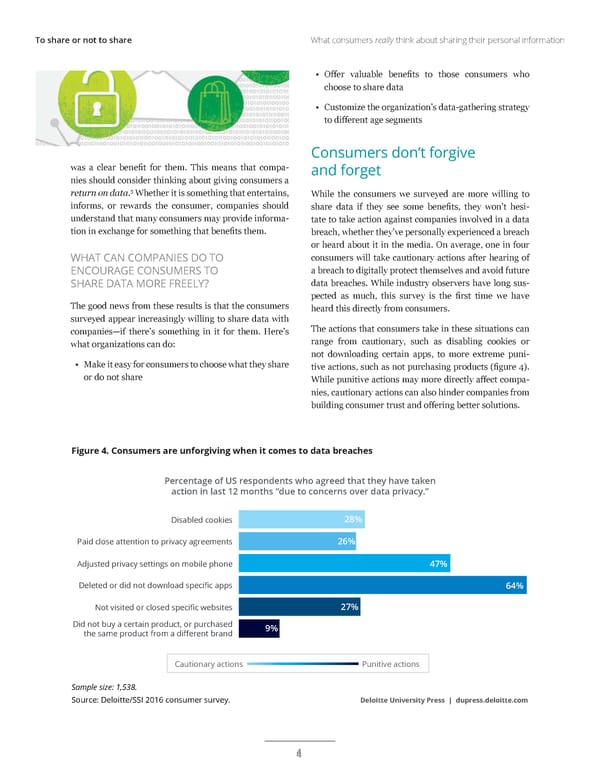To share or not to share What consumers really think about sharing their personal information • Offer valuable benefits to those consumers who choose to share data • Customize the organization’s data-gathering strategy to different age segments Consumers don’t forgive was a clear benefit for them. This means that compa- and forget nies should consider thinking about giving consumers a return on data.5 Whether it is something that entertains, While the consumers we surveyed are more willing to informs, or rewards the consumer, companies should share data if they see some benefits, they won’t hesi- understand that many consumers may provide informa- tate to take action against companies involved in a data tion in exchange for something that benefits them. breach, whether they’ve personally experienced a breach or heard about it in the media. On average, one in four WHAT CAN COMPANIES DO TO consumers will take cautionary actions after hearing of ENCOURAGE CONSUMERS TO a breach to digitally protect themselves and avoid future SHARE DATA MORE FREELY? data breaches. While industry observers have long sus- pected as much, this survey is the first time we have The good news from these results is that the consumers heard this directly from consumers. surveyed appear increasingly willing to share data with companies—if there’s something in it for them. Here’s The actions that consumers take in these situations can what organizations can do: range from cautionary, such as disabling cookies or not downloading certain apps, to more extreme puni- • Make it easy for consumers to choose what they share tive actions, such as not purchasing products (figure 4). or do not share While punitive actions may more directly affect compa- nies, cautionary actions can also hinder companies from building consumer trust and offering better solutions. Figure 4. Consumers are unforgiving when it comes to data breaches Percentage of US respondents who agreed that they have taken action in last 12 months “due to concerns over data privacy.” Disabled cookies 28% Paid close attention to privacy agreements 26% Adjusted privacy settings on mobile phone 47% Deleted or did not download specific apps 64% Not visited or closed specific websites 27% Did not buy a certain product, or purchased 9% the same product from a different brand Cautionary actions Punitive actions Sample size: 1,538. Source: Deloitte/SSI 2016 consumer survey. Deloitte University Press | dupress.deloitte.com 4 4
 DUP: To Share Or Not To Share Page 3 Page 5
DUP: To Share Or Not To Share Page 3 Page 5